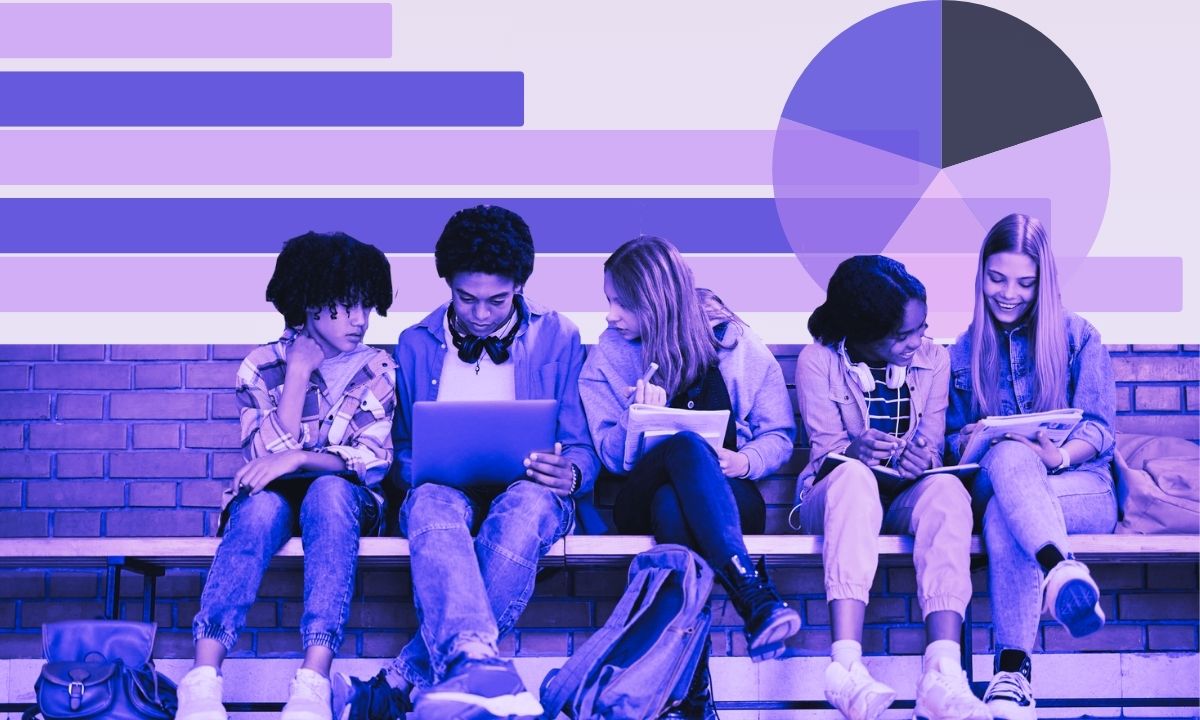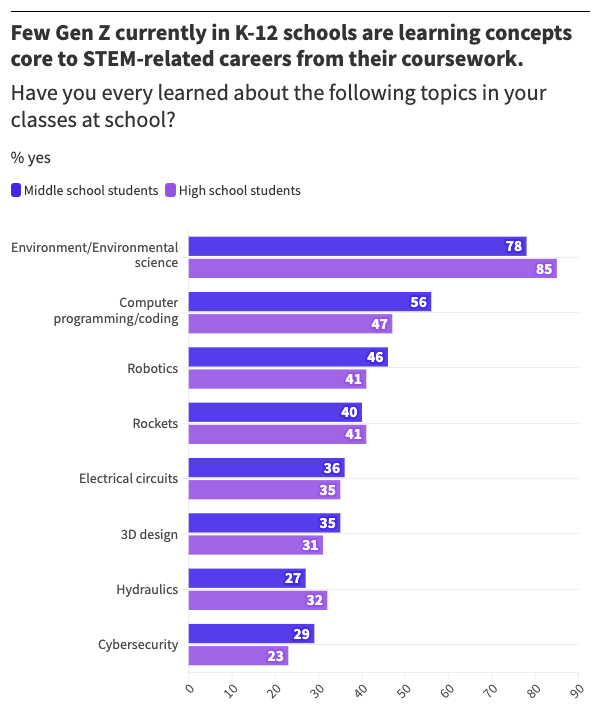4 Ways Gen Z Is Thinking About Their Education and Future
New national polls reveal a concerned, mindful Gen Z, seeking stronger mental health offerings & STEM career foundations for a 'functional adulthood.'

Get stories like this delivered straight to your inbox. Sign up for The 74 Newsletter
Witnessing the American dream get “kicked in the teeth,” watching their and peers’ families struggle for basic necessities like food, healthcare and homes, Gen Z is reimagining what school and career should look like, two new national polls reveal.
Kids, teens and young people, who researchers say are historically more likely to be optimistic than older generations, are overwhelmingly concerned about peers’ and their own mental health, as well as their futures and the nation’s political environment.
“Gen Z is a group of people who care and have gone through a kind of collective trauma — I think we see it,” said Amanda Lenhart, lead researcher with Common Sense Media, which has just released a report on the state of kids and families in America. “They’re kind of fed up. They’re worried about the future and they really would like people to pay attention.”
When asked what would improve life for children in the United States, Gen Z said a better education system. They and voters point to a need for increased mental health care offerings and affordability, job preparation classes and free after-school programming.
For Gen Z, schools are “where they see an opportunity for assistance and amelioration,” Lenhart explained. Across party lines older members of the generation shared the same desire: for schools to provide more wraparound services like health care and food pantries, aligned more with the community school model.
Lenhart and fellow researchers are interested in what will come when the remaining Gen Z youth reach voting age, because “they have a lot of frustration about what they see as a little bit of a kicking of the American dream in the teeth. That is, a sense of my own opportunities are diminished; I see my peers burdened with this mental health crisis.”
For many, feeling frustrated and stressed has impacted future aspirations: An overwhelming 75% of Gen Z has interest in at least one STEM field, with the next most popular fields being healthcare and arts, media or journalism – areas that offer long careers and support society.
Yet many feel their goals are out of reach: less than a third will pursue STEM, according to Gallup and the Walton Foundation’s latest Voices of Gen Z report. Outside of environmental science applications, the majority haven’t been exposed to foundational material like computer programming or coding, robotics, or electrical circuits.
Here’s a recap of four key findings from the nearly 3,000 12-26 year olds surveyed late last year by Common Sense Media, Gallup and the Walton Foundation.
1. Mental health & gun violence are the most concerning issues for kids and teens right now.
Nearly a third of Gen Z feels that youth mental health challenges are the most pressing issue for their generation, with girls and white children citing the issue more than their peers. When asked about top concerns at schools specifically, the number grows dramatically: 53% said mental health.
They attribute the cause of the mental health crisis to two main sources: bullying or discrimination, and social media.
About 21% of Gen Z feels gun violence is the most pressing issue for their generation — even more so for Black kids and teens, 28% of whom cited gun violence.
In just the first month of 2024, about 400 children and teens were wounded or killed by gun violence.
2. Most of Gen Z are interested in STEM careers, but less than a third plan to pursue them.
A major gap is emerging between desire and preparedness for STEM careers. The gap is even more stark for girls, who are less likely than peers to pursue the field, due in part to a lack of mentors who students can identify with, imposter syndrome, and facing stereotypes about who is capable.
“Half of gen Z is far less confident than the other half that they’re even good at this,” said Gallup pollster Zach Hrynowski of the gender gap, adding that prior research has confirmed the importance of having diverse STEM teachers and mentors, who can help students break through inadequacy, fear or systemic barriers.
Having a teacher or mentor that looks like you or has shared life experiences can make a world of difference. For a Black student to have a Black computer science teacher, Hrynowski added, could “make you more likely to want to step through that door that currently is not something that you’re being pulled through by virtue of the curriculum.”

Simultaneously, there’s a huge discrepancy of middle and high school STEM offerings across the country that has left the majority of Gen Z high schoolers unexposed to basic courses and curriculum such as computer programming, 3D design, cybersecurity and hydraulics.
Researchers fear a potential hit to the American economy.
According to the Bureau of Labor Statistics, the number of STEM jobs will increase 11% by 2032. About 1.4 million technical jobs, in fields like engineering and computer science, may go unfilled by then if pipelines aren’t built up imminently.
3. Most of Gen Z believe better education is the key to improving lives of children in the US
The majority of voters across party lines agree with young people — about 53% point to the education system as a saving grace for children in the U.S.
Likely voters, including some older Gen Zers, say their top education priorities are getting kids to read at grade level, teacher burnout and associated shortages, bullying, and student mental health. They believe individualized learning plans, increased teacher pay, more social, emotional and mental health support, and smaller class sizes would make the biggest impact.
At the same time, young people feel like political priorities are misaligned. About 60% of Gen Z believe politicians do not reflect the needs, desires, and experience of young people in this country well.
“They feel like people in elected office and people in positions of power aren’t listening to them, not doing a good job of representing what young people need,” said Lenhart.
4. They’re still optimistic: 70% of young people think they’ll be about the same or better off than their parents in adulthood
Despite coming of age during periods of extreme violence, social unrest, and historical traumas, including 9/11 and a pandemic, Gen Zers are still more cautiously optimistic about their future prospects than voters writ large.
In contrast, only about 22% of likely voters who are not parents believe children today will be better off than they are now.
Yet a majority of parents of color are in hopeful alignment with Gen Z: 60% of Black parents, 62% of Asian American and Pacific Islander parents, and 52% of Latino parents say kids today will be “better off.” Just over a third of white parents believe this to be the case.
Black kids and teens are the most hopeful subgroup, with just over half saying they will be better off.
“The more we can help create a functional adulthood for our teenagers and our young adults,” Lenhart said, “where they’re not worried about meals, health care, their own safety, their ability to take care of their families when people get sick … if we can make that better, then people will feel better.”
Disclosure: Walton Family Foundation provides financial support to The 74.
Get stories like these delivered straight to your inbox. Sign up for The 74 Newsletter

;)
